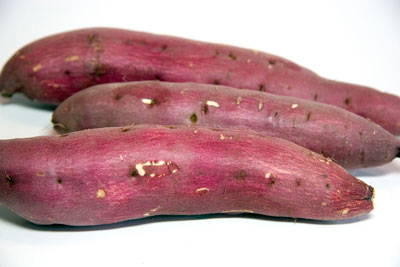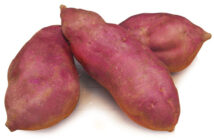A Massey University PhD student has developed a complementary food for infants in developing nations that could help minimise vitamin A deficiency.
Francis Kweku Amagloh used sweet potato as the base ingredient for the food, which he hopes will address some of the micronutrient deficiencies in the vulnerable period when infants transition to solid food. Complementary or weaning foods are usually introduced into the diet at around six months.
After working for the World Health Organization, Dr Amagloh found infants in his home nation Ghana were mostly given cereal-based complementary food, prepared from white maize, that is devoid of vitamin A precursors. This spurred his interest in researching strategies to improve infant nutrition for his PhD.
His supervisor, Associate Professor Jane Coad of the College of Health, says it is a common problem in developing nations. “These children often falter in growth and get anaemia and vitamin A deficiency because the household-level weaning foods introduced don’t provide adequate micronutrients,” she says.
“In Ghana, like a lot of developing nations, the traditional cereal-based porridge is low in micronutrients and high in phytate, which binds to the iron and stops it from being absorbed.”
Using New Zealand kumara (sweet potato), Dr Amagloh developed a food product at Massey’s Food Pilot Plant that could be easily stored and rehydrated with water. It has low phytate and is high in vitamin A precursors and could serve as a good dietary source of vitamin A. The powder could also be manufactured easily in developing nations with locally grown sweet potatoes.
Dr Coad says Massey has unique capability across food and nutrition that allowed Dr Amagloh to complete the project. “We took this right across the breadth of expertise of the institute, so although Francis is a nutritionist, we used Massey’s expertise in food technology at the pilot plant and the expertise in postharvest technology and sensory evaluation.”
Dr Amagloh, whose study at Massey was funded by NZAID, is now back in Ghana with the University for Development Studies. He is seeking funding to carry out more research on the nutritional advantages of sweet potato and plans to continue collaborating with staff at the Institute of Food, Nutrition and Human Health in the College of Health. His PhD thesis was included in the Dean’s List of Exceptional Doctoral Theses.
“Although the sweet potato-based weaning food would positively contribute in reducing vitamin A deficiency among children, we cannot be certain if it will help reduce iron deficiency,” Dr Amagloh says. “This question will only be answered through an infant feeding trial.”





























































































